(In Part 1 of his report from Budapest’s dunaPart3 showcase, which ran Mar. 2–8, our reporter frames the festival’s offerings as a response to both the nation’s rightward-shifting politics and to feedback about a previous Hungarian showcase, in 2013. We meet him again midway through the week’s program.)
The next several days continued a rich, varied, multidisciplinary, often outspoken body of work, including several contemporary dance and performance pieces. (Much of the dance program ran on a parallel, mutually exclusive track with the theatre offerings.)
In Auction, a droll comment on the plight of today’s independent artist, dancer/choreographer Krisztián Gergye offered an up-close, paint-drenched solo to Ravel’s “Boléro” over a makeshift canvas—with splatter-proof plastic wrap stretching like a security blanket over the first row of wary audience members—before seguing into an art auction in which the artist himself becomes self-promoter and salesman with podium and gavel, selling off (unsuccessfully, as it turned out, before this international crowd with, no doubt, already tightly packed carry-ons) four still-moist panels mingling the paint and sweat and other bodily detritus of the spent performer. (Locals explained that the second half of the piece often turns quite lively, with debate and haggling over the value and meaning of the “product” and art in general.)
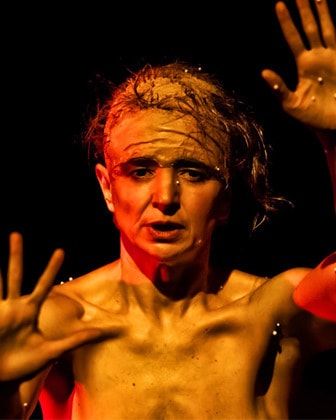
The notable dancer/choreographer Réka Szabó and her company, the Symptoms, offered two pieces. Szabó’s solo, I Will Be All of These Things One Day, was an offbeat, charming and strangely urgent love affair with her audience in which the performer asks disarmingly blunt questions of those before her as she staves off a brutal pounding at the door. I Don’t Remember Being Raised Like This features Szabó and three other dancer-performers in a coy, whimsical exploration of each performer’s expectations around aging at various points along a continuum beginning with childhood, before ultimately drawing back into an unexpectedly euphoric vision of impermanence.
DunaPart3 also included guided dips into Budapest’s cultural landscape, like the impressive new Aurora House, a collectively run alternative Jewish community and arts space located in the colorfully low-key, immigrant-heavy enclave of Budapest’s District 8. Urban Fate Tourism, an environmental theatre company led by dramaturg-turned-director Martin Boross, took the concept of guided tour up a notch with its mobile festival offering. A chartered bus ride through a Budapest residential neighborhood, Promenade—which premiered in 2013 and is built to be adaptable to any urban landscape—is enlivened by a site-specific set of vignettes planted here and there among the indigenous flora and fauna, and headsets featuring a soundscape speckled with pensive narrative passages delivered by an actor seated just behind the driver.
The piece presents no single storyline but rather the threads of many gradually overlapping half-told tales, which the audience completes or not, in much the way any passing scene glimpsed from a moving vehicle may lend itself to the imagination: A wandering tourist stops to help a seemingly pregnant woman (while another woman fleeces his open backpack); a woman in a hospital gown bolts down the street, followed eventually by a desperate orderly in white; a relentless jogger pounds by; a fussy professional spars with a fed-up house painter. Actors appearing on the streets in this whimsical narrative roundabout occasionally step onto the bus and ride along, as loose themes of memory and wonder emerge, along with notions of seeing and not seeing and the nature of that particular fleeting contact we share as city animals. Certainly, as a trip through town it’s an eye-opener, and charmingly played by a sharp cast.
Among the scheduled talks were illuminating discussion of the political history and theatrical representation (or lack thereof) of Hungary’s significant Roma population (estimated at roughly one million). There was also an insightful panel of female directors and choreographers at the forefront of a changing but still highly male-dominated scene. Among these latter was Ildikó Gáspár, whose production of Schiller’s Mary Stuart was on view at the Örkény Theatre—a relatively small but mighty repertory house where she is a company member.
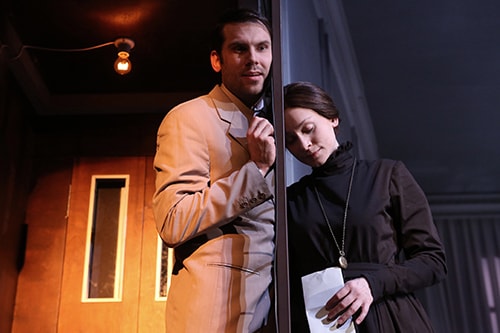
As panel moderator Anna Réz explained, few women are accepted to the directing program at the University of Theatre and Film (Budapest’s dominant institution for theatre professionals), and accordingly very few women directors work in Hungary. Those who are directing, like Gáspár, often start off as dramaturgs. “It’s tough to begin,” says Gáspár, who admits she got very little encouragement along the way. “It was really hard to get the opportunity to make the first step.”
Panni Néder, another young director on the panel and a graduate of the University’s directing program, was the only woman in her class. “I had many problems with the system, and many problems as a woman [there],” she explained, noting at least one professor who went so far as to posit that women were biologically unprepared for anything more than raising a family. She compared this situation to Berlin, where she has found much more equality and the idea of women directing a non-issue. “It’s a cultural problem [in Hungary], in my opinion.”
Zsuzsa Rózsavölgyi, a dancer/choreographer who studied at PARTS in Brussels and spent five years in Anne Teresa De Keersmaeker’s company before striking out on her own, acknowledged that women are perhaps better represented as makers in the dance world, although glaring inequities persist there too. At the same time, she hailed what she sees as a change in traditional concepts of the female body and feminine beauty brought on by the physical rigor of much contemporary dance. Rigor was fully on display in her own festival offering, Pond, as well as in impressive contemporary choreographer Adrienn Hod’s exuberantly comical male/female pas de quatre, Conditions of Being a Mortal.
“I hope after a while that this strength becomes more fashionable,” said Rózsavölgyi, referring to the majority of young women who “are still thinking of their bodies as an object and not as a body that allows them to move in space and to be somebody.”
As a teacher, Rózsavölgyi registers a cultural shift underway in her students. “I see in the artist’s world this is really changing,” she continued. “I think young girls are coming to dance because they realize movement is much more important than how they look. It’s not about becoming an object anymore, it’s about making their bodies capable of doing things.”
DunaPart3 was, with one exception, a Budapest program, which hints at the long-standing division in Hungary between the cosmopolitan center and the more traditional and conservative provinces. But as the discussion on women in the performing arts made clear, the program spanned other divides as well, including aesthetic and generational ones.
The sole exception to the Budapest-born productions was a Transylvanian company called Ground Floor Group and its piece, Parallel. In the roughly hour-long performance, two young women retreat from a hapless workout session at the lip of the stage to either side of a wall running down its center, where in isolation they each explore and subvert deeply gendered regimes of identity and social control through a set of transmogrifying movements and reincarnations.
Significantly, before embarking on the comical workout, each performer spends a long moment merely staring out at the audience. The return of the gaze harnesses a well-established feminist logic, both setting the tone and hinting at the political context for the almost equally minimalist but potent gestures that follow. A fine and intelligent work, Parallel is in conversation with contemporary modes of queer performance outside the theatre mainstream, and as such opened up an unexpected horizon in the program somewhere between contemporary dance/performance and club-based drag culture.
Other offbeat and smaller-scale productions in the festival suggested a divide between younger companies pursuing more intimate and less overtly political projects—such as Home, a bare-bones-rehearsal-like take on August Strindberg’s The Pelican from apartment-theatre denizens dollardaddy’s—and the more unrestrained, politically pointed, director-driven theatre of the country’s fortsomething stars: Árpád Schilling, Viktor Bodó and Béla Pintér. Also among this well-established rank of auteur is Sándor Zsótér, who directed an intentionally listless production of Othello, set in a tacky modern kitchen and reverberating with the poisonous retreat of politics into the home, and Kornél Mundruczó, the filmmaker-turned-theatremaker whose graphically violent adaptation of South African novelist J.M. Coetzee’s Disgrace inspired several outraged walkouts in 2013.
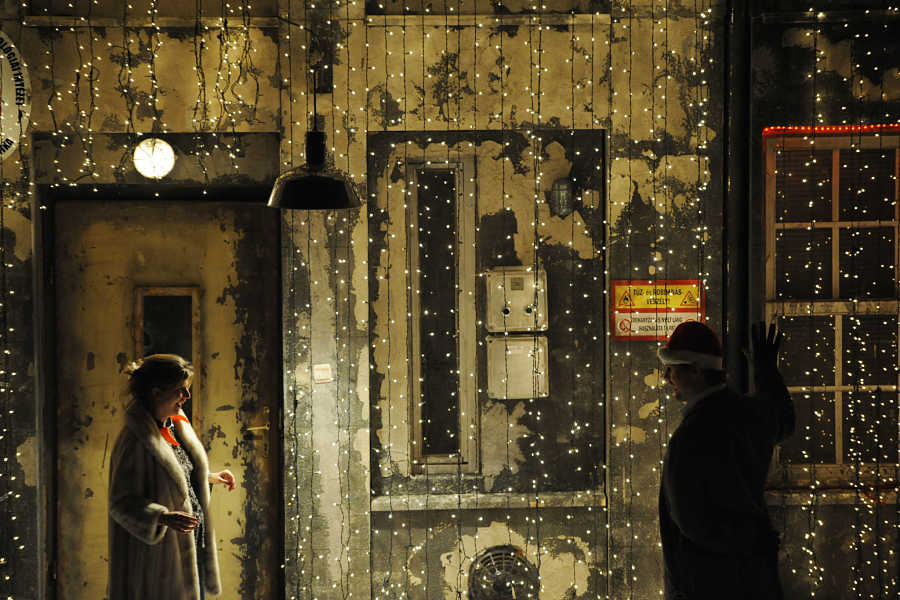
Mundruczó and his company, Proton Theatre, were on hand again this year with Dementia, another well-acted and strikingly staged indictment of the status quo that presented itself as a revolt within a psychiatric hospital. If that sounds a little One Flew Over the Cuckoo’s Nest-y, the play is actually inspired by events closer to home—namely the real-life shuttering in 2013 of a world-famous health facility in Hungary, which serves precisely as a metaphor for a larger system in which the primacy of profits undermines social mores and relationships, leaving the most vulnerable among us literally out in the cold.
An engrossing and often giddy mix of realism and whimsy, the piece featured bravura performances and extreme situations, like the hysterically macabre scene in which the story’s privatizing villain gets his severed tongue sewn back on under the glare of a video camera projecting the operation onto the back wall. All these trademark Mundruczó touches unfolded on a split-level set repurposed from his extraordinary 2006 staging for Krétakör of Vladimir Sorokin’s dystopic fascist fantasia, Ice, a piece that helped put this cinematic auteur squarely on the international theatre map.
In a lean production that made a virtue of a few basic ingredients, most of them edible, accomplished director Csaba Horváth’s The Notebook proved an extremely elegant piece of physical work in the Poor Theatre tradition. An adaptation of the acclaimed novel by Hungarian expat Ágota Kristóf (1935–2011), The Notebook featured a deft six-person cast on a stage bare but for a few choice symbols of life and economy in wartime: assorted squash, sacks of potatoes, handfuls of dried noodles and more, all ingeniously utilized throughout. The harrowing story followed twin brothers, raised by their resourceful grandmother amid the morally warping violence, deprivation and degradation of World War II.
Béla Pintér Company’s Our Secrets also looked back at the 20th century in a bid to better understand the current one, in what was perhaps the festival’s most successful blend of theatrical élan and political bite. Setting his story in the folk revival “dance house” subculture of the Budapest 1980s to tell a contemporary tale of abuse of power, playwright/director Pintér’s wonderfully acted, beautifully staged play proved hilarious and horrifying by turns—and fast turns at that, pivoting around its theme of corrupted lives with the effortless precision of a film by Pedro Almodóvar.
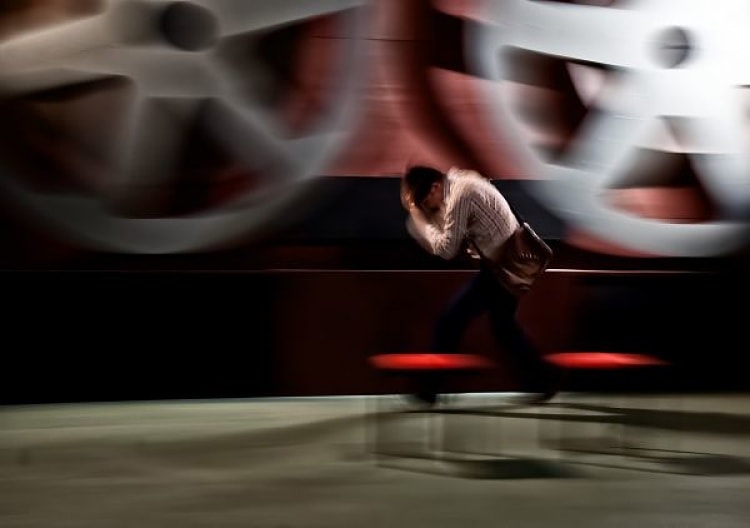
The stage comes overshadowed by an enormous reel-to-reel tape player—a canny representation of both the folk music revival and the total surveillance state that neatly evokes and updates a certain ambivalent nostalgia. The action is set in a dance house at the center of the folk revival subculture, where a group of enthusiasts led by expert dancer and singer Imre (played by Pintér) make up a seemingly harmless movement tolerated by the Communist regime, as distinct perhaps from the Goth-like underground music scene, which also finds some fleeting representation here in the play’s subtly drawn characters and lively original score (played variously by actors and the musicians stationed on either side of the stage).
Imre turns out to be editor-in-chief of a certain samizdat paper railing regularly against the regime. Meanwhile, another member of the dance house, folk music collector István Balla Bán (played with hangdog humor and a quiet but wrenching anguish by Zoltán Friedenthal) is tortured by his unnatural attraction to his seven-year-old stepdaughter Timike (played by the sharp and vivacious Éva Enyedi). Although hiding this private shame from his wife and friends, István is helpless to keep it from the ears of the state, which listens in on his psychiatric sessions, and soon finds himself blackmailed into becoming a government informer.
The company displays a remarkable flair, never devolving into mere caricature, even in cross-dressing roles that would end up as pure shtick in lesser hands. Instead, the actors infuse each role with a definite humanity, a recognizable absurdity, vulnerability and violence to which all are potentially susceptible and on which abusive structures of power rely. Mingling humor and tragedy in a deft production enthralling to behold, Our Secrets starkly paints the politics of the present precisely in terms of the buried secrets of the past, namely the unwillingness of subsequent governments to name or discuss the legacy of the widespread network of informers that elevated careers even as it destroyed lives.
Seeing Pintér and his troupe at work once more—the company was represented in three separate productions back in 2013—it’s easy to understand why they currently represent the most financially and critically successful model of an independent theater at work in Hungary and abroad today. Theirs are crowd-pleasing shows in an almost old-fashioned theatrical vein that nonetheless manage to feel utterly fresh, urgent and devilishly intelligent.
Finally, as the pièce de résistance—and resistance is the key word—there was Kretakör and Loser, Schilling’s self-referential satire and the festival’s much-anticipated closer. It begins with Schilling on a bare stage eying the audience as it enters. He’s alone but for a bust (of Marx, maybe, or some bushy-bearded heavy) near his feet. He explains the nature of the show and the situation. It has to do with a system that makes the kind of work he wants to do all but impossible, because its capricious and arcane policy of funding culture doesn’t provide artists with the ability to plan for anything.
Things then start to happen fast: Schilling strips naked, proffers a felt marker and invites audience members to write their messages to the powers that be on his flesh. Several do. Soon he introduces his wife and fellow artist Lilla Sárosdi, who he says doesn’t quite agree with his approach. She confirms this shyly. Then Schilling is interrupted by an audience member disgusted with what a once serious company and artist have come to. Schilling, still naked, tries to stop the man from marching out, and runs after him out of the theatre. Sárosdi remains onstage and spots an old friend in the audience; they strike up a conversation, which continues onstage in a suddenly materialized living room set.
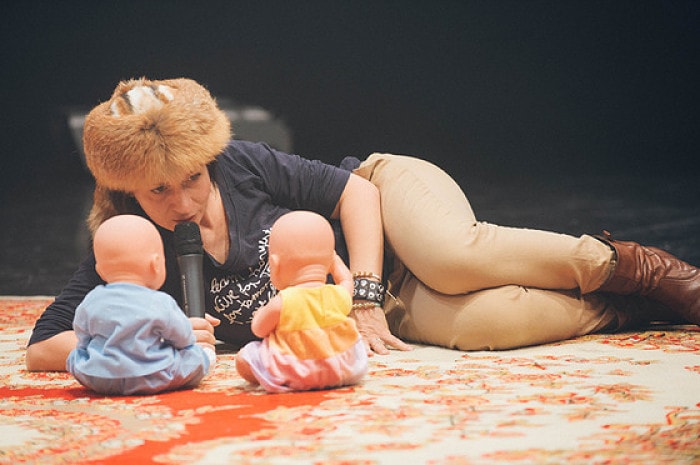
Things continue to evolve from there: Schilling reappears at different points in ever greater guises of pathetic self-entitlement and self-loathing. A band appears. Deals are made. Handjobs doled out. A handsome, sophisticated Mephistophelean figure with money appears and woos Sárosdi with a reinvigorated career onstage. It all spirals upward in a series of climaxes and anticlimaxes whose significance creeps in like the slow dawn on a long night’s debauch.
Like Pintér’s Our Secrets, Loser vividly demonstrates the way political corruption seeps into private life, as social and personal pathologies entwine. Its mode is entirely distinct, however, blending arch self-parody with well-aimed mockery and unruly cabaret. It doesn’t so much unfold as writhe and unravel in a series of unpredictable but cunningly connected scenes, producing a staggering momentum that builds for 90 minutes or so until, like a rock concert that’s had the electricity abruptly turned off—or a culture that has had the rug pulled out from under it—everything comes to a terse and silent halt.
Robert Avila is a San Francisco–based critic and arts journalist.


